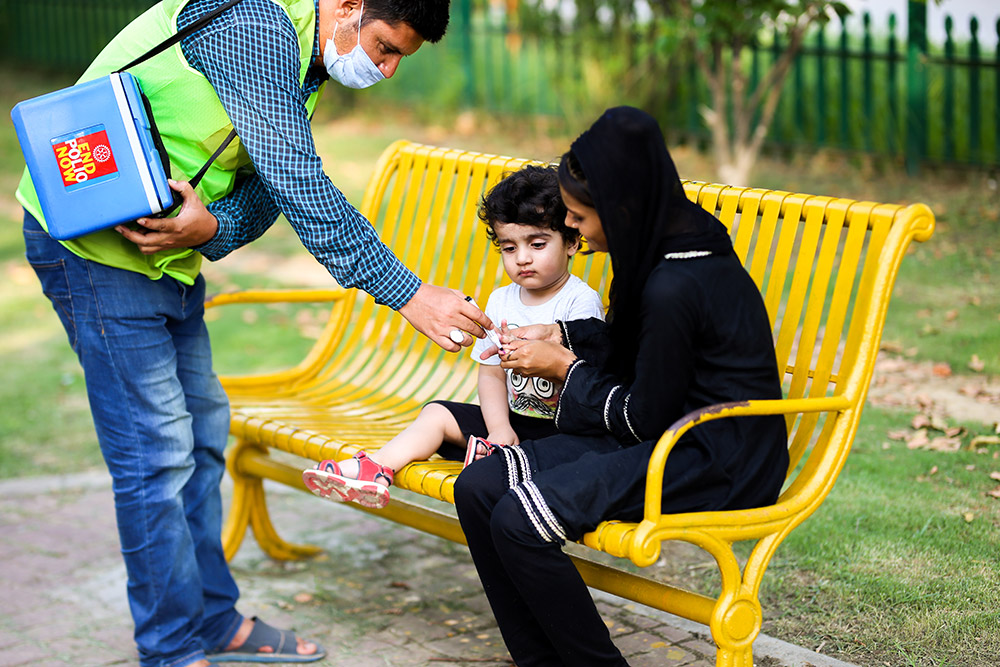 Credit: WHO/WHO Pakistan
Credit: WHO/WHO Pakistan
26 March 2024 – To strengthen the fight against polio, health ministers from across the WHO Eastern Mediterranean Region gathered virtually for the 10th meeting of the Regional Subcommittee on Polio Eradication and Outbreaks. It was the first meeting of the Subcommittee convened by the new WHO Regional Director for the Eastern Mediterranean, Dr Hanan Balkhy.
Her Excellency Dr Hanan Al-Kuwari, Minister of Public Health, Qatar, and Subcommittee Co-chair, welcomed Dr Balkhy’s determination to end polio during her tenure. His Excellency Mr Abdul Rahman Mohammed Al Oweis, Minister of Health and Prevention of the United Arab Emirates, and Subcommittee Co-chair, represented by His Excellency Dr Hussain Al Rand, also expressed enthusiasm that Dr Balkhy’s vision and expertise promise to propel regional efforts, bringing the world closer to eradication.
“One of my key priorities as your Regional Director is to strengthen our region’s public health capacities so that you have all the tools not only to end transmission of polio, but to ensure that polio can indeed never make a comeback,” said Dr Hanan Balkhy, in her address to Member States of the Region.Two children have been paralysed by wild poliovirus already in 2024 – both from Baluchistan, Pakistan. Environmental surveillance has also continued to detect poliovirus in districts outside the endemic zones in Afghanistan and Pakistan – the world’s only remaining polio-endemic countries –including in the northern and southern border corridors. Elsewhere in the Region, outbreaks of variant polioviruses have persisted, with some emerging as conflict and insecurity have expanded.
Dr Hamid Jafari, Director of Polio Eradication for the WHO Eastern Mediterranean Region, briefed the Subcommittee on the current epidemiological situation. He underscored the urgency of these efforts, stressing the need for sustained vigilance and coordinated action.
In Pakistan, the recent changes in political leadership present a chance to renew national commitment to end the disease. The Subcommittee commended Pakistan’s unwavering dedication, emphasizing the critical role of strong leadership to drive progress and overcome challenges in the fight against polio.
Two new statements issued by the Subcommittee at the meeting reaffirm its commitment to polio eradication. The first emphasizes the importance of sustained political commitment and investment in wild poliovirus eradication efforts in Afghanistan and Pakistan.
The second statement focuses on stopping transmission of vaccine-derived poliovirus type 2 in Yemen’s northern governorates and in Somalia. It stresses the need to reach all remaining zero-dose children and intensify outbreak response activities as well as enhance routine immunization coverage. An outbreak response in Yemen’s northern governorates is long overdue.
The Subcommittee recognized Dr Sania Nishtar, the new Chief Executive Officer of Gavi, the Vaccine Alliance who brings extensive experience and visionary leadership for bolstering global immunization efforts and advancing the fight against polio.
As the meeting ended, participants stressed the need to maintain high-quality surveillance across the Region, including reporting polio detections in line with the International Health Regulations (2005). Timely and accurate reporting not only facilitates rapid response efforts but also ensures that resources are effectively allocated to those areas most in need. Intensified cross-border collaboration was also highlighted as imperative to address outbreaks and endemic transmission reservoirs and to prevent the virus from spreading across borders.
Subcommittee members also recognized ongoing efforts to integrate polio into broader immunization and health programmes. Countries such as Pakistan, Somalia and Sudan have been delivering other services and antigens alongside polio vaccines to children.
In the face of ongoing challenges, the 10th meeting of the Regional Subcommittee on Polio Eradication and Outbreaks served as a rallying cry for renewed commitment and collaboration. Stakeholders reaffirmed their resolve to overcome obstacles and bring an end to polio once and for all, to ensure a healthier and more resilient future for generations to come.
About the Subcommittee
The Regional Subcommittee on Polio Eradication and Outbreaks was set up in October 2020, following resolution EM/RC67/R4. It has since created unparalleled solidarity among Member States of the WHO Eastern Mediterranean Region and polio partners.
This collective action has brought the Region closer to attaining both the goals of the Global Polio Eradication Initiative strategy: to end wild poliovirus transmission, and to stop and prevent the spread of variant poliovirus outbreaks.
Through its work, the Subcommittee has contributed to strengthen health systems across the Region and advance health equity, including by increasing access to children for vaccination, no matter where they live.




